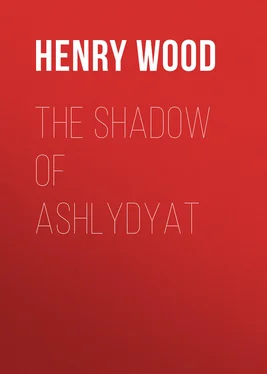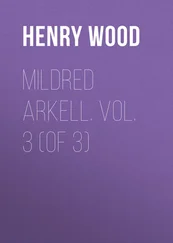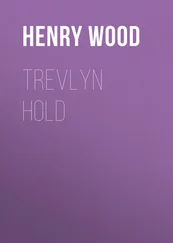Henry Wood - The Shadow of Ashlydyat
Здесь есть возможность читать онлайн «Henry Wood - The Shadow of Ashlydyat» — ознакомительный отрывок электронной книги совершенно бесплатно, а после прочтения отрывка купить полную версию. В некоторых случаях можно слушать аудио, скачать через торрент в формате fb2 и присутствует краткое содержание. Жанр: foreign_prose, literature_19, foreign_antique, на английском языке. Описание произведения, (предисловие) а так же отзывы посетителей доступны на портале библиотеки ЛибКат.
- Название:The Shadow of Ashlydyat
- Автор:
- Жанр:
- Год:неизвестен
- ISBN:нет данных
- Рейтинг книги:4 / 5. Голосов: 1
-
Избранное:Добавить в избранное
- Отзывы:
-
Ваша оценка:
- 80
- 1
- 2
- 3
- 4
- 5
The Shadow of Ashlydyat: краткое содержание, описание и аннотация
Предлагаем к чтению аннотацию, описание, краткое содержание или предисловие (зависит от того, что написал сам автор книги «The Shadow of Ashlydyat»). Если вы не нашли необходимую информацию о книге — напишите в комментариях, мы постараемся отыскать её.
The Shadow of Ashlydyat — читать онлайн ознакомительный отрывок
Ниже представлен текст книги, разбитый по страницам. Система сохранения места последней прочитанной страницы, позволяет с удобством читать онлайн бесплатно книгу «The Shadow of Ashlydyat», без необходимости каждый раз заново искать на чём Вы остановились. Поставьте закладку, и сможете в любой момент перейти на страницу, на которой закончили чтение.
Интервал:
Закладка:
Thomas Godolphin might have been all the better for a little sun then—not speaking figuratively. I mean the good sun that illumines our daily world; that would be illumining my pen and paper at this moment, but for an envious fog, which obscures everything but itself. The moon was not shining as it had shone the last night he left Lady Sarah’s, when he had left his farewell kiss—oh that he could have known it was the last!—on the gentle lips of Ethel. There was no moon yet; the stars were not showing themselves, for a black cloud enveloped the skies like a pall, fitting accompaniment to his blasted hopes; and his path altogether was dark. Little wonder then, that Thomas Godolphin all but fell over some dark object, crouching in his way: he could only save himself by springing back. By dint of peering, he discovered it to be a woman. She was seated on the bare earth; her hands clasped under her knees, which were raised almost level with her chin which rested on them, and was swaying herself backwards and forwards as one does in grief; as Lady Sarah Grame had done not long before.
“Why do you sit here?” cried Thomas Godolphin. “I nearly fell over you.”
“Little matter if ye’d fell over me and killed me,” was the woman’s response, given without raising her head, or making any change in her position. “’Twould only have been one less in an awful cold world, as seems made for nothing but trouble. If the one half of us was out of it, there’d be room perhaps for them as was left.”
“Is it Mrs. Bond?” asked Thomas Godolphin, as he caught a glimpse of her features.
“Didn’t you know me, sir? I know’d you by the voice as soon as you spoke. You have got trouble too, I hear. The world’s full of nothing else. Why does it come?”
“Get up,” said Thomas Godolphin. “Why do you sit there? Why are you here at all at this hour of the night?”
“It’s where I’m going to stop till morning,” returned the woman, sullenly. “There shall be no getting up for me.”
“What is the matter with you?” he resumed.
“Trouble,” she shortly answered. “I’ve been toiling up to the work’us, asking for a loaf, or a bit o’ money: anything they’d give to me, just to keep body and soul together for my children. They turned me back again. They’ll give me nothing. I may go into the union with the children if I will, but not a stiver of help’ll they afford me out of it. Me, with a corpse in the house, and a bare cubbort.”
“A corpse!” involuntarily repeated Thomas Godolphin. “Who is dead!”
“John.”
Curtly as the word was spoken, the tone yet betrayed its own pain. This John, the eldest son of the Bonds, had been attacked with the fever at the same time as the father and brother. They had succumbed to it: this one had recovered: or, at least, had appeared to be recovering.
“I thought John was getting better,” observed Thomas Godolphin.
“He might ha’ got better, if he’d had things to make him better! Wine and meat, and all the rest of it. He hadn’t got ’em; and he’s dead.”
Now a subscription had been entered into for the relief of the poor sufferers from the fever, Godolphin, Crosse, and Godolphin having been amongst its most liberal contributors; and to Thomas Godolphin’s certain knowledge, a full share, and a very good share, had been handed to the Bonds. Quite sufficient to furnish proper nourishment for John Bond for some time to come. He did not say to the woman, “You have had enough: where has it gone to? it has been wasted in riot.” That it had been wasted in riot and improvidence, there was no doubt, for it was in the nature of the Bonds so to waste it; but to cast reproach in the hour of affliction was not the religion of everyday life practised by Thomas Godolphin.
“Yes, they turned me back,” she resumed, swaying herself nose and knees together, as before. “They wouldn’t give me as much as a bit o’ bread. I wasn’t going home without taking something to my famished children; and I wasn’t going to beg like a common tramp. So I just sat myself down here; and I shan’t care if I’m found stark and stiff in the morning!”
“Get up, get up,” said Thomas Godolphin. “I will give you something for bread for your children to-night.”
In the midst of his own sorrow he could feel for her, improvident old sinner though she was, and though he knew her to be so. He coaxed and soothed, and finally prevailed upon her to rise, but she was in a reckless, sullen mood, and it took him a little effort before it was effected. She burst into tears when she thanked him, and turned off in the direction of the Pollard cottages.
The reflection of Mr. Snow’s bald head was conspicuous on the surgery blind: he was standing between the window and the lamp. Thomas Godolphin observed it as he passed. He turned to the surgery door, which was at the side of the house, opened it, and saw that Mr. Snow was alone.
The surgeon turned his head at the interruption, put down a glass jar which he held, and grasped his visitor’s hand in silence.
“Snow! why did you not write for me?”
Mr. Snow brought down his hand on a pair of tiny scales, causing them to jangle and rattle. He had been bottling up his anger against Lady Sarah for some days now, and this was his first explosion.
“Because I understood that she had done so. I was present when that poor child asked her to do it. I found her on the floor in Sarah Anne’s chamber. On the floor, if you’ll believe me! Lying there, because she could not hold her aching head up. My lady had dragged her out of bed in the morning, ill as she was, and forced her to attend as usual upon Sarah Anne. I got it all out of Elizabeth. ‘Mamma,’ she said, when I pronounced it to be fever, though she was almost beyond speaking then, ‘you will write to Thomas Godolphin.’ I never supposed but that my lady did it. Your sister, Miss Godolphin, inquired if you had been written for, and I told her yes.”
“Snow,” came the next sad words, “could you not have saved her?”
The surgeon shook his head and answered in a quiet tone, looking down at the stopper of a phial, which he had taken up and was turning about listlessly in his fingers.
“Neither care nor skill could save her. I gave her the best I had to give. As did Dr. Beale. Godolphin,”—raising his quick dark eyes, flashing then with a peculiar light—“she was ready to go. Let it be your consolation.”
Thomas Godolphin made no answer, and there was silence for a time. Mr. Snow resumed. “As to my lady, the best consolation I wish her, is, that she may have her heart wrung with remembrance for years to come! I don’t care what people may preach about charity and forgiveness; I do wish it. But she’ll be brought to her senses, unless I am mistaken: she has lost her treasure and kept her bane. A year or two more, and that’s what Sarah Anne will be.”
“She ought to have written for me.”
“She ought to do many things that she does not do. She ought to have sent Ethel from the house, as I told her, the instant the disorder appeared in it. Not she. She kept her in her insane selfishness: and now I hope she’s satisfied with her work. When alarming symptoms showed themselves in Ethel, on the fourth day of her illness, I think it was, I said to my lady, ‘It is strange what can be keeping Mr. Godolphin!’ ‘Oh,’ said she, ‘I did not write to him.’ ‘Not write!’ I answered: and I fear I used an ugly word to my lady’s face. ‘I’ll write at once,’ returned she humbly. ‘Of course,’ cried I, ‘when the steed’s stolen we shut the stable-door.’ It’s the way of the world.”
Another pause. “I would have given anything to take Ethel from the house at the time; to take her from the town,” observed Thomas Godolphin in a low tone. “I said so then. But it could not be.”
Читать дальшеИнтервал:
Закладка:
Похожие книги на «The Shadow of Ashlydyat»
Представляем Вашему вниманию похожие книги на «The Shadow of Ashlydyat» списком для выбора. Мы отобрали схожую по названию и смыслу литературу в надежде предоставить читателям больше вариантов отыскать новые, интересные, ещё непрочитанные произведения.
Обсуждение, отзывы о книге «The Shadow of Ashlydyat» и просто собственные мнения читателей. Оставьте ваши комментарии, напишите, что Вы думаете о произведении, его смысле или главных героях. Укажите что конкретно понравилось, а что нет, и почему Вы так считаете.












